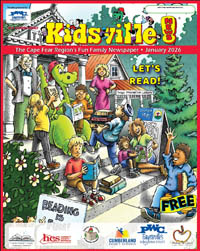
Last year, Cumberland County and the Department of Social Services collaborated on the “Not Perfect … Just Willing” campaign. This campaign aimed to create more awareness for families and adults in Cumberland County to take an interest in being a foster family. The goal was to raise the number of foster families from 51 to 115.
That number is currently 47 — a step backward for the department, according to Delores Long, the Division Director of Children's Services for Cumberland County’s Department of Social Services.
According to Long, 585 children were needing some care. That includes the young adults who aged out (ages 18 to 21) but still received some services.
According to Long, at the end of December, 208 children were placed in family foster homes. Eight were placed in family foster homes of a relative, three were placed in adoptive foster homes, and 134 were placed in other home settings.
But there still isn’t enough room to fit all those children. That means 197 children are being placed out of the county, and 19 are placed outside North Carolina.
“The only children who could be in those 47 licensed homes are children who have no identified mental health or behavioral health needs. So that's why it’s called family foster homes. So they are the only ones who will qualify for those homes. If children have been identified as having higher needs, they wouldn't qualify to be in those family foster homes anyway. They would have to be in therapeutic homes,” Long said.
Last year, Long told the Cumberland County Board of Commissioners that 275 children were placed out of the county and 42 were placed outside of the state.
“Due to the limited number of placements that children have available to them now across the state, I don’t see any time soon that stopping. We will probably always have a need for kids to go outside of the state, even outside the county, just because of treatment facilities. Cumberland County doesn’t have an abundance of treatment facilities. So when it comes to that, children will always have to go outside the county and sometimes outside the state just because their needs are so severe that we cannot find them placements within the state,” Long said.
One positive for Long is the fact that unlike many in the rest of North Carolina or in the country, children are not sleeping or staying at the Department of Social Services. Cumberland County’s DSS owns a residential group home facility that is certified. That facility, Safe Landing Group Home, has room for six children at a time.
“We do allow those children to reside there while they are awaiting placement so that they have a home-like environment to be in,” Long said.
The typical wait time in the residential facility varies depending on the needs of the child. According to Long, level two and level three children tend to have longer wait times, even as long as six months. Children who need to go to a Psychiatric Residential Treatment Facility may have the longest wait.
There is another building that can be used to house children if Safe Landing Group is filled, but that is an office building and not a certified home.
In 2022, over 10,000 children were in the foster care system in North Carolina, according to iFoster, a nonprofit foster care resource organization.
Not Perfect … Just Willing
In order to be a foster parent with Cumberland County, you must be at least 21 years old, get fingerprinted and have a criminal records check, complete a TIPS-MAPP course, complete an application, be reviewed by the NC Division of Social Services, complete foster home licensing, have no prior abuse or neglect reports, and re-license every two years.
Another issue for foster families is that in Cumberland County, many families move due to work and the large military population here, and licenses don’t transfer over state lines.
The campaign to get more foster families that launched last year in the county, and this year across North Carolina, keeps emphasizing that you do not need to be a perfect person to become a foster parent.
You do not have to own a home or have a certain amount of income to be a foster or adoptive parent. You can be single, partnered, married, divorced or widowed. They are asking for people to provide children with stability, connection and time.
“I think the biggest thing about foster care is that foster care is a temporary living arrangement, so it is not designed to be long term. Ideally, we work to try to reunify children with their parents that first 12 months of them being in custody. So we need homes that understand that this is a temporary arrangement, but they're willing to be truly temporary parents to our children,” Long said.
“We want people who are going to have these children in their homes and treat them as if they're their own children. However, understanding that it can be short-term. And so that’s just the biggest thing. We don’t want children just to be housed somewhere. We want them to actually be part of the family’s home.”
While reunification is the main goal for the Department of Social Services, that rate was 36.84% at the end of their fiscal year, June 30. Long says a lot of that has to do with the justice system. Once children are separated from their parents, it is up to a judge to make that final determination to reunite families.
For more information on becoming a foster parent, visit the Cumberland County Department of Social Services online at https://www.ccdssnc.com/child-services/.

 How to resolve AdBlock issue?
How to resolve AdBlock issue? 








